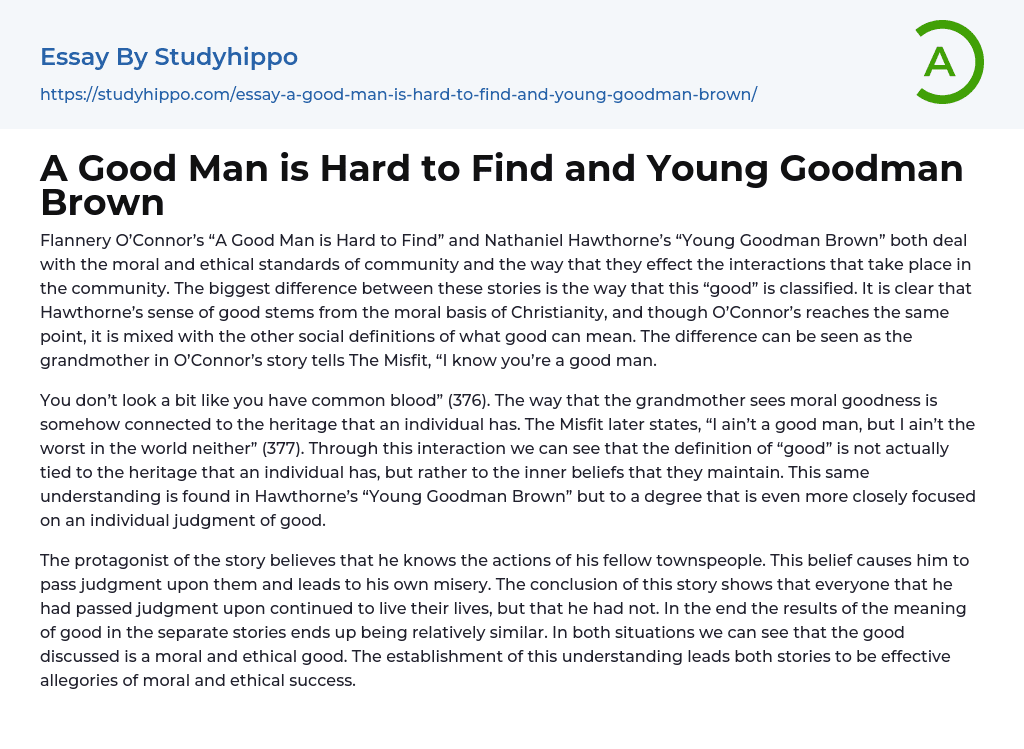

A Good Man is Hard to Find and Young Goodman Brown Essay Example
Flannery O’Connor’s “A Good Man is Hard to Find” and Nathaniel Hawthorne’s “Young Goodman Brown” both deal with the moral and ethical standards of community and the way that they effect the interactions that take place in the community. The biggest difference between these stories is the way that this “good” is classified. It is clear that Hawthorne’s sense of good stems from the moral basis of Christianity, and though O’Connor’s reaches the same point, it is mixed with the other social definitions of what good can mean. The difference can be seen as the grandmother in O’Connor’s story tells The Misfit, “I know you’re a good man.
You don’t look a bit like you have common blood” (376). The way that the grandmother sees moral goodness is someho
...w connected to the heritage that an individual has. The Misfit later states, “I ain’t a good man, but I ain’t the worst in the world neither” (377). Through this interaction we can see that the definition of “good” is not actually tied to the heritage that an individual has, but rather to the inner beliefs that they maintain. This same understanding is found in Hawthorne’s “Young Goodman Brown” but to a degree that is even more closely focused on an individual judgment of good.
The protagonist of the story believes that he knows the actions of his fellow townspeople. This belief causes him to pass judgment upon them and leads to his own misery. The conclusion of this story shows that everyone that he had passed judgment upon continued to live their lives, but that he had not. In the end the
results of the meaning of good in the separate stories ends up being relatively similar. In both situations we can see that the good discussed is a moral and ethical good. The establishment of this understanding leads both stories to be effective allegories of moral and ethical success.
- Values of Life essays
- Ethical dilemma essays
- Normative Ethics essays
- Virtue Ethics essays
- Belief essays
- Deontology essays
- Moral essays
- Virtue essays
- Work Ethic essays
- Acceptance essays
- Age Of Enlightenment essays
- Child Observation essays
- Confucianism essays
- Conscience essays
- Critical Reflection essays
- Destiny essays
- Determinism essays
- Empiricism essays
- Environmentalism essays
- Epistemology essays
- Ethics essays
- Ethos essays
- Existence essays
- Existentialism essays
- Fate essays
- Free Will essays
- Functionalism essays
- Future essays
- Good And Evil essays
- Human Nature essays
- Individualism essays
- Meaning Of Life essays
- Metaphysics essays
- Natural Law essays
- Personal Philosophy essays
- Philosophers essays
- Philosophy Of Life essays
- Political Philosophy essays
- Pragmatism essays
- Reality essays
- Relativism essays
- Teaching Philosophy essays
- Time essays
- Transcendentalism essays
- Truth essays
- Utilitarianism essays
- Boy essays
- Gay essays
- Gender essays
- Gender Identity essays



